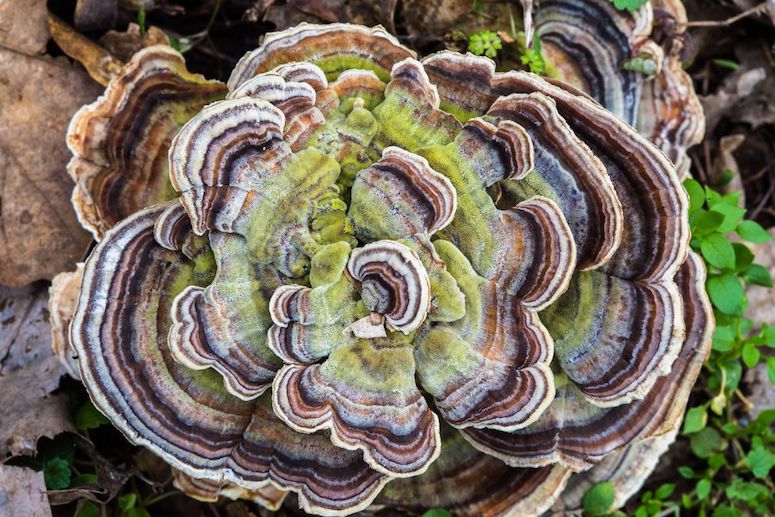TURKEY TAIL MUSHROOM BENEFITS — HOW IT SUPPORTS A HEALTHY MICROBIOME*

TURKEY TAIL MUSHROOM PROMOTES A HEALTHY MICROBIOME*
We are living in an age where supporting the gut microbiome is all the rage.* In modern health blogs, we often read about how much the gut supports our overall health and its deep connection to our brain and immune system. Probiotics, prebiotics, and fermented foods and drinks (such as kombucha and kefir) have become popular for their gut-supporting qualities and are now more available to the public.
Did you know that mushrooms are now being highlighted for their prebiotic qualities? Read on to find out how Turkey Tail mushrooms can help support the gut microbiome.*
What is the Gut Microbiome?
The gut microbiome consists of microorganisms, which are mostly “good bugs” living in the gastrointestinal tract. These microorganisms help us digest what we eat, as well as absorb and synthesize nutrients. Gut health supports many of our bodies’ important functions, such as metabolism, weight, and immune support, as well as healthy normal brain activity and mood.
Based on one’s environments and habits, each person’s gut looks slightly different — yours is as unique to you as your fingerprint. Your gut naturally contains diverse bacteria.
Want to promote a healthy and naturally diverse gut microbiome?* Integrate healthy habits — eat a nourishing and balanced diet, exercise regularly, support the normal natural stress response, maintain health normal sleep despite occasional restlessness, and support the immune system naturally.* 
Turkey Tail Mushroom History
Turkey Tail mushrooms (Trametes versicolor) can be found in the wild with bands of colors such as orange, blue, white, and tan. These mushrooms earned their name because they resemble the tail of a turkey. In Latin, Trametes means “one who is thin,” and versicolor means “variously colored.”
This mushroom has long been used in Japanese folk herbalism to support healthy cellular growth. In Traditional Chinese modalities, Turkey Tail is used to support lung health as well as liver health.*
Back in 1965, a chemical engineer in Japan observed his neighbor taking a traditional herbal preparation. After several months of learning about the neighbor and his traditional approach to health, the engineer convinced his colleagues to examine the mushrooms — and soon PSK was born. PSK, or polysaccharide-K, is 1-3 beta-glucan, a polysaccharide that supports the immune system.* PSK is now the chief ingredient in Krestin, which is used in Japan to support immune health. Chinese researchers were then inspired to develop Polysaccharide Peptide (PSP), another type of polysaccharopeptide extract found in this mushroom and used for similar immune supporting purposes.
MUSHROOMS AND PREBIOTICS
Simply put, prebiotics are food for probiotics. These fermented ingredients (essentially dietary fiber) promote gut health by supporting various functions of your gastrointestinal microbiota. Turkey Tail contains prebiotic fiber.
In one study looking at the gut microbiome, researchers found that Turkey Tail mushroom benefits the gut microbiome by acting as a prebiotic and promoting diversity in the gut.* PSK has been shown to provide prebiotic support to gut health as well.
Turkey Tail at Mushroom Revival
Here at Mushroom Revival, we love talking about gut health! We can be found enjoying fermented foods, fermented drinks, and regularly incorporating mushroom allies into our diets and supplements. Turkey Tail mushrooms can be found in our Daily 10 Tincture. We invigorate the health of the planet by planting a tree for every product sold. Be a part of the revival story with your purchase!
*These statements have not been evaluated by the FDA. These products are not intended to diagnose, treat, cure or prevent any disease.






















